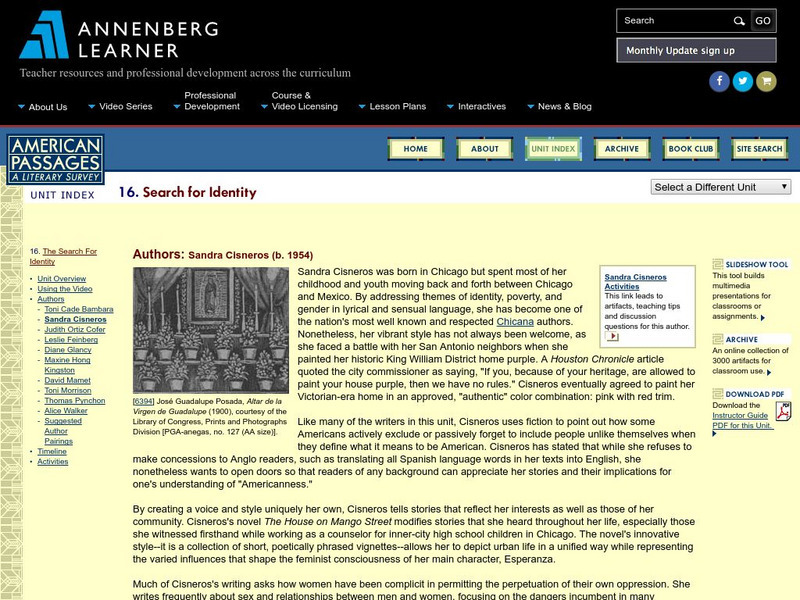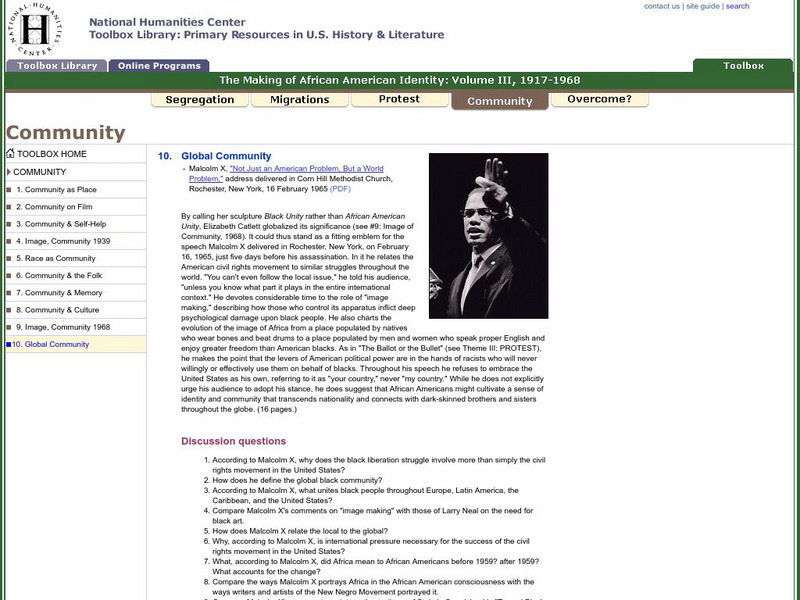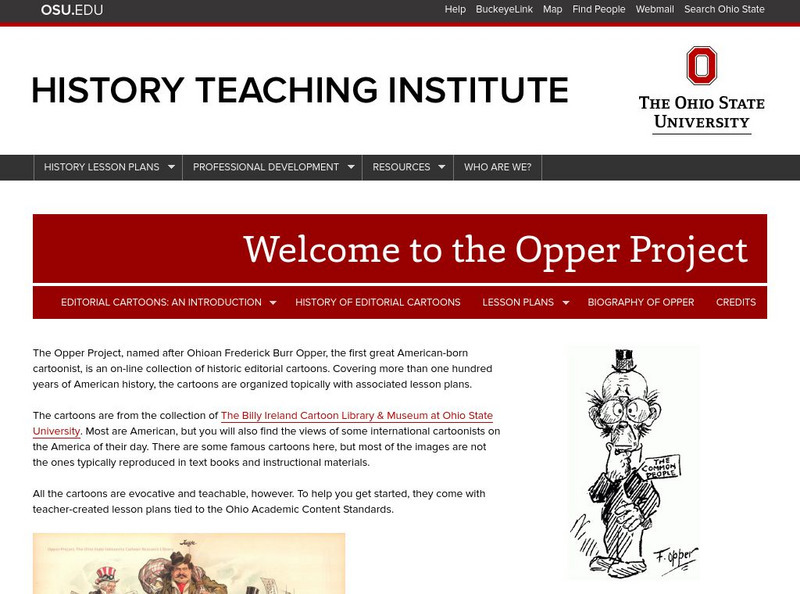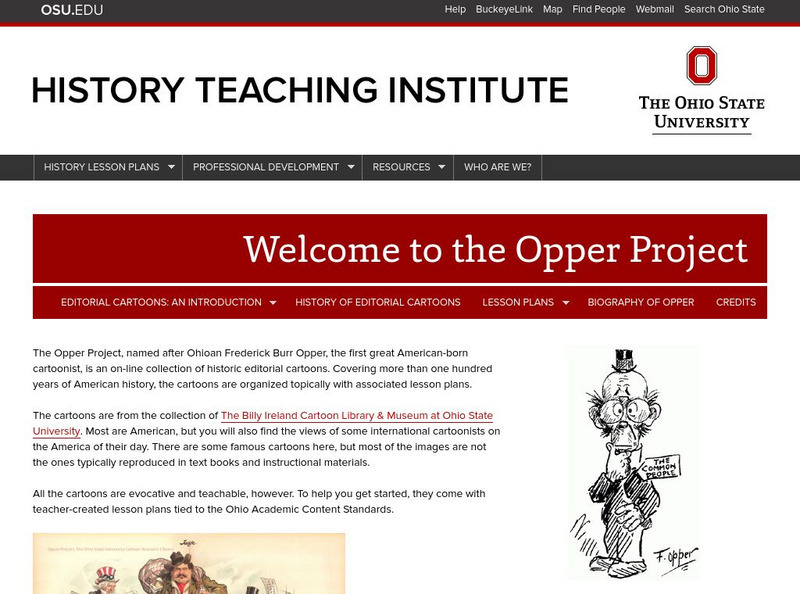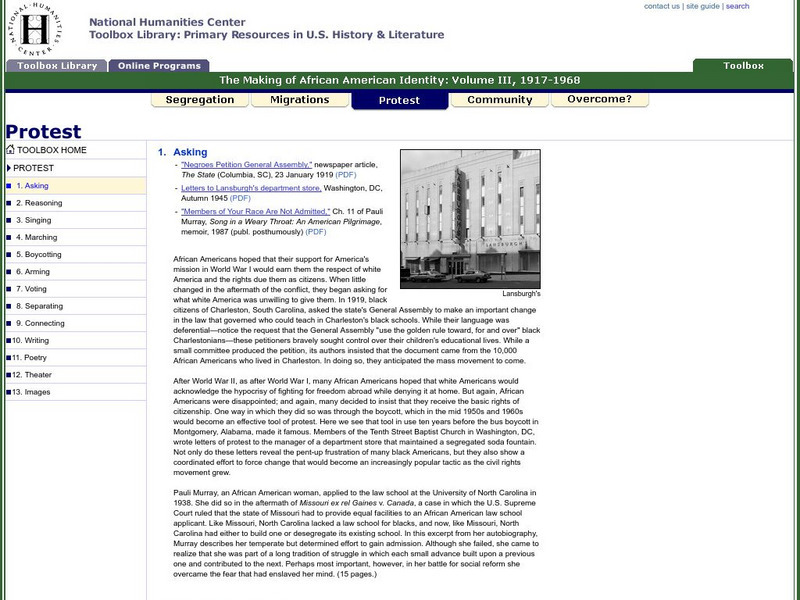Hi, what do you want to do?
Ducksters
Ducksters: Civil Rights for Kids: Little Rock Nine
Kids learn about the history of the Little Rock Nine on this site. Site discusses how African-American students who fought to end segregation by attending an all-white high school.
PBS
Pbs Teachers: February One (Lessons on the Greensboro Sit in of 1960)
Find two lesson plans developed for a PBS documentary about the Greensboro Four, whose sit-in at a whites-only Woolworth's lunch counter was a key event in the unfolding history of the civil rights movement. The lessons ask students to...
Library of Congress
Loc: Draft of Elizabeth Cady Stanton's "The Woman's Bible"
This article focuses on the philosophy and strategies of Elizabeth Cady Stanton, as well as the fight for women's right to vote.
Constitutional Rights Foundation
Constitutional Rights Foundation: Harriet Tubman and the End of Slavery [Pdf]
Article on Harriet Tubman describes her life and heroism as a leader of the Underground Railroad and of the fight against slavery. Includes questions for discussion and group activity.
Annenberg Foundation
Annenberg Learner: American Passages: The Search for Identity: Sandra Cisneros
Sandra Cisneros is featured for her literary prose, drawing on her personal heritage as a Chicana to exhibit her "Americanness" in order to share hope for other minority women. See "Sandra Cisneros Activities" for related materials.
Curated OER
University of Michigan:the Kennedy Myth and Civil Rights
Short paper in which the author asserts that Kennedy, contrary to popular belief, was a reluctant supporter of the Civil Rights movement.
Curated OER
University of Michigan:the Kennedy Myth and Civil Rights
Short paper in which the author asserts that Kennedy, contrary to popular belief, was a reluctant supporter of the Civil Rights movement.
Curated OER
University of Michigan:the Kennedy Myth and Civil Rights
Short paper in which the author asserts that Kennedy, contrary to popular belief, was a reluctant supporter of the Civil Rights movement.
Curated OER
University of Michigan:the Kennedy Myth and Civil Rights
Short paper in which the author asserts that Kennedy, contrary to popular belief, was a reluctant supporter of the Civil Rights movement.
Free Management Library
Employee Law: Civil Rights Act of 1964
This site contains the original text of the legislation, with related links.
PBS
Pbs Learning Media: Un(re)solved: Frontline: Interactive
Un(re)solved tells the stories of lives cut short and examines a federal effort to investigate more than 150 cold cases that date back to the civil rights era. Learn about and speak the names of the many people whose lives were lost...
A&E Television
History.com: Martin Luther King, Jr.
Martin Luther King, Jr. was a social activist and Baptist minister who played a key role in the American civil rights movement from the mid-1950s until his assassination in 1968. King sought equality and human rights for African...
National Humanities Center
National Humanities Center: Toolbox Library: Global Community, Making of African American Identity: V. 3
On February 16, 1965, in Rochester, New York, Malcolm X delivered a speech that placed African American in a global black community. Just five days before his assassination, he relates the American civil rights movement to similar...
Khan Academy
Khan Academy: Us History: 1945 1980: The Montgomery Bus Boycott
Learn about Rosa Parks's courageous decision to fight discrimination and the boycott that ended segregation on public buses.
National Women’s History Museum
National Women's History Museum: Coretta Scott King
Although best known for being the wife of famed civil rights leader Dr. Martin Luther King Jr, Coretta Scott King created her own legacy. Learn interesting details about her life.
PBS
Pbs Learning Media: Voter Registration Training Tool
Students at Miles College in Birmingham developed this "crib sheet" and questionnaire to help black citizens become registered voters and to document racial discrimination in the voting process in the 1950s.
Ohio State University
Opper Project: Using Editorial Cartoons to Teach History (Lesson Plans)
Two dozen lessons that focus on using political cartoons as primary source resources for teaching American history. Lessons cover a range of topics in U.S. history from the Civil War era forward and are linked to Ohio content standards.
Ohio State University
Opper Project: Using Editorial Cartoons to Teach History (Lesson Plans)
Two dozen lessons that focus on using political cartoons as primary source resources for teaching American history. Lessons cover a range of topics in U.S. history from the Civil War era forward and are linked to Ohio content standards.
CommonLit
Common Lit: "I Have a Dream" by Dr. Martin Luther King, Jr.
King delivered his "I Have a Dream" speech to over 250,000 people from the steps of the Lincoln Memorial in Washington, D.C., during the March on Washington for Jobs and Freedom on August 28, 1963. In this speech, King discusses racial...
National Humanities Center
National Humanities Center: Teacher Serve: Segregation
Steven Lawson, Professor of History at Rutgers, explores how racial segreagation changed from before the Civil War up to the 1950s and the differences in segregation between the North and the South. Students should understand the legacy...
Curated OER
Finding Dulcinea: Rosa Parks, Mother of the Civil Rights Movement
Rosa Parks is featured in this brief biography highlighting her contributions to Civil Rights.
National Humanities Center
National Humanities Center: Toolbox Library: Asking, Making of African American Identity: V. 3
Attempts by African Americans to petition for their civil rights are described within this resource. This include attempts by the black citizens of Charleston to ask for civil rights by petition rather than demand them with protest.
Scholastic
Scholastic News: Kids Who Fought for Change
Read a first-hand account of a child of the civil rights movement, and learn about the struggles of fighting for change.
Georgia Department of Education
Ga Virtual Learning: American Literature: Postmodernism: "Everyday Use"
This lesson focuses on Alice Walker and her short story "Everyday Use," which explores the generation gap between a mother and daughter and the relationship among a mother and her two daughters. Links are provided to the text of the...






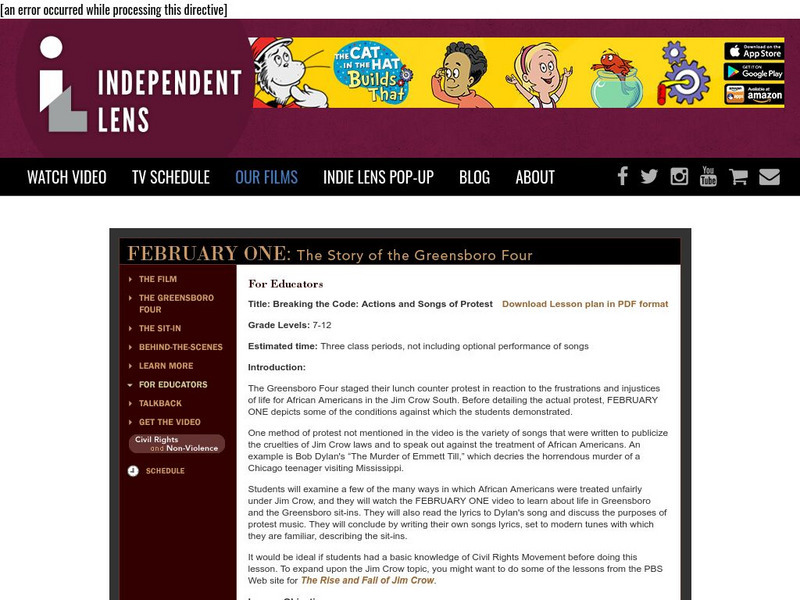

![Constitutional Rights Foundation: Harriet Tubman and the End of Slavery [Pdf] Activity Constitutional Rights Foundation: Harriet Tubman and the End of Slavery [Pdf] Activity](https://static.lp.lexp.cloud/images/attachment_defaults/resource/large/FPO-knovation.png)
